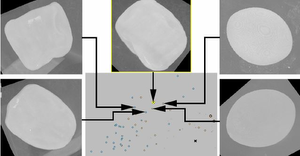Information
- Publication Type: Master Thesis
- Workgroup(s)/Project(s):
- Date: November 2020
- Date (Start): 12. January 2020
- Date (End): 25. November 2020
- TU Wien Library:
- Second Supervisor: Manuela Waldner
- Diploma Examination: 15. December 2020
- Open Access: yes
- First Supervisor: Eduard Gröller
- Pages: 105
- Keywords: Visualization-Guided Classification, Ancient Seeds
Abstract
Since the Neolithic Revolution approximately 10.000 years ago, crop plants are an important part of our food. Researchers of archeobotany try to find and determine the species that humankind used already in the past. Most of the gathered samples are preserved due to carbonization, but the shape and inner structures are deformed because of this process. The amount of distortion is given by the temperature and the time they are heated. Normally, an expert is consulted to classify them. Since there are only a few experts in this field, an automatic approach is requested. The result of this work is a software, which can load the Computed Tomography (CT) scans, segment and separate the seeds within the samples, calculate different shape features as descriptors, and train a classifier. To have an overview of how the seeds look like, different volume visualizations are available to show selected samples or median seeds of each class. To validate the probabilities of the learner, additional visualizations are available, which show the influence of the extracted features on the classification. A cross validation method with 1043 known samples results in a classification accuracy of 85 %. The incorrectly classified samples of the ground truth are visualized to display the expert user where they are located regard to the extracted features and which results are especially inaccurate. It turned out, that the opportunity to export the features into a tabular filetype and the visualization of the output probabilities of the classifier for each species were particularly helpful for the domain experts.Additional Files and Images
Weblinks
BibTeX
@mastersthesis{Gogel2020,
title = "Visualization-Guided Classification of Carbonized Seeds
from Early Human Civilizations",
author = "Andreas Gogel",
year = "2020",
abstract = "Since the Neolithic Revolution approximately 10.000 years
ago, crop plants are an important part of our food.
Researchers of archeobotany try to find and determine the
species that humankind used already in the past. Most of the
gathered samples are preserved due to carbonization, but the
shape and inner structures are deformed because of this
process. The amount of distortion is given by the
temperature and the time they are heated. Normally, an
expert is consulted to classify them. Since there are only a
few experts in this field, an automatic approach is
requested. The result of this work is a software, which can
load the Computed Tomography (CT) scans, segment and
separate the seeds within the samples, calculate different
shape features as descriptors, and train a classifier. To
have an overview of how the seeds look like, different
volume visualizations are available to show selected samples
or median seeds of each class. To validate the probabilities
of the learner, additional visualizations are available,
which show the influence of the extracted features on the
classification. A cross validation method with 1043 known
samples results in a classification accuracy of 85 %. The
incorrectly classified samples of the ground truth are
visualized to display the expert user where they are located
regard to the extracted features and which results are
especially inaccurate. It turned out, that the opportunity
to export the features into a tabular filetype and the
visualization of the output probabilities of the classifier
for each species were particularly helpful for the domain
experts.",
month = nov,
pages = "105",
address = "Favoritenstrasse 9-11/E193-02, A-1040 Vienna, Austria",
school = "Research Unit of Computer Graphics, Institute of Visual
Computing and Human-Centered Technology, Faculty of
Informatics, TU Wien",
keywords = "Visualization-Guided Classification, Ancient Seeds",
URL = "https://www.cg.tuwien.ac.at/research/publications/2020/Gogel2020/",
}

 Image
Image Master Thesis
Master Thesis Poster
Poster


